To keep your finances simple, start by knowing your income and listing all your expenses. Set clear spending limits for categories like groceries and entertainment, then track every purchase to stay on budget. Prioritize essential needs and aim to save a small emergency fund for unexpected costs. Review your budget each month to make adjustments as your situation changes. Keep these basics in mind, and you’ll find managing money more straightforward—stick around to learn more tips that can make it even easier.
Key Takeaways
- Track all income and expenses to understand your cash flow clearly.
- Set specific spending limits for categories like groceries and entertainment to avoid overspending.
- Regularly monitor and record your expenses to identify spending habits and areas for improvement.
- Prioritize essential needs and build an emergency fund covering 3-6 months of expenses.
- Review and adjust your budget monthly to stay aligned with your financial goals and changing circumstances.
Understand Your Income and Expenses

To create an effective budget, you first need to know exactly how much money you bring in and where it goes. Track your income from all sources, including paychecks, side jobs, and investments. Then, list your expenses, such as rent, utilities, groceries, and entertainment. This clear picture helps you identify spending habits and areas where you can improve. Implement saving strategies by setting aside a portion of your income regularly, making savings automatic if possible. Good debt management is also vital—understanding your debts helps you prioritize payments and avoid unnecessary interest. Recognizing the importance of authenticity and existence can also influence how you approach financial planning and life choices. By understanding your income and expenses, you gain control over your finances, making it easier to build savings and reduce debt effectively. This foundation ensures your budget works for you, not against you.
Set Clear Spending Limits
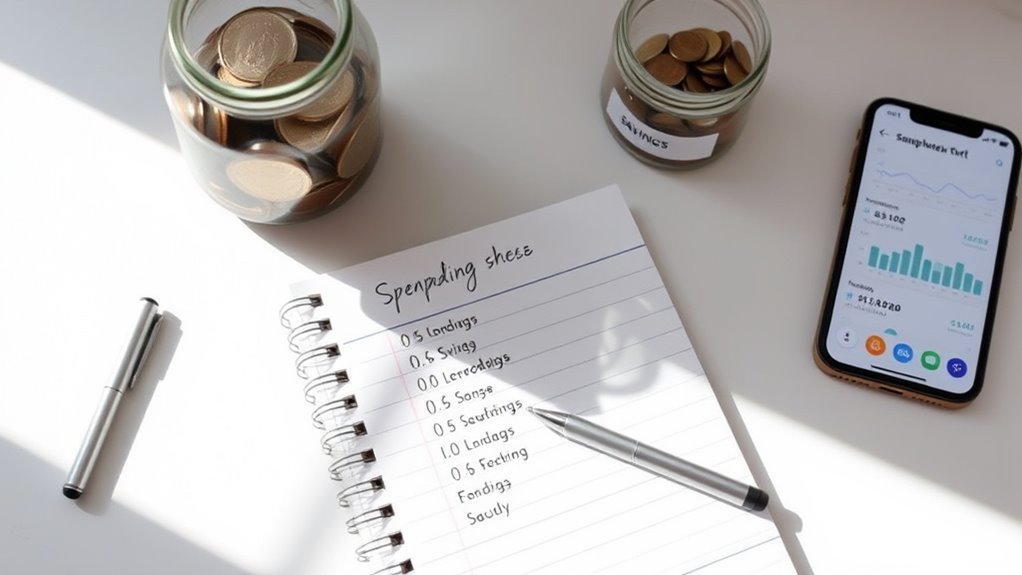
Setting clear spending limits helps you stay on track with your budget and avoid overspending. When you define specific amounts for categories like groceries, entertainment, or dining out, you guarantee your spending aligns with your savings goals. These limits prevent impulsive purchases that can derail your financial plans. By sticking to your limits, you free up funds to boost your savings or invest wisely, supporting your long-term investment strategies. Regularly reviewing and adjusting these limits keeps your budget realistic and flexible as your financial situation changes. Clear boundaries make it easier to prioritize essential expenses and savings, giving you control over your money. Understanding asset division laws can also help you plan your budget more effectively during significant life changes. Ultimately, setting and respecting these limits empowers you to achieve financial stability and growth.
Track Your Spending Regularly
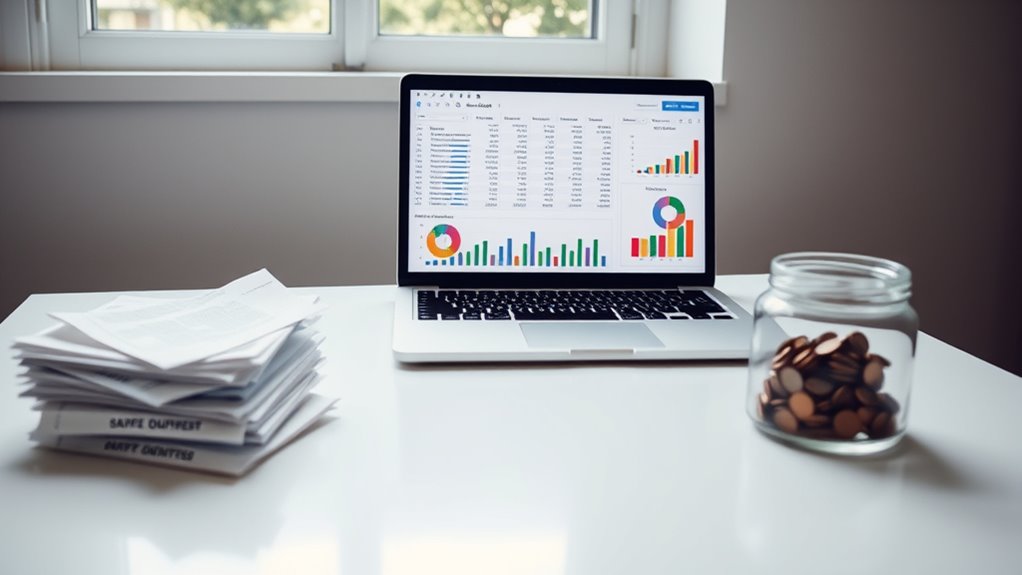
Have you ever wondered where your money really goes each month? Tracking your spending regularly helps you see your cash flow clearly. By monitoring your expenses, you can identify which categories eat up most of your budget, like dining out, groceries, or entertainment. This habit keeps you aware and prevents overspending. Use a simple app or notebook to record every purchase, making it easier to spot patterns and stay on top of your financial habits. When you understand your expense categories, you gain insight into where to cut back if needed. Consistent tracking also helps you adjust your budget as your income or spending habits change. Making this a routine empowers you to take control of your finances and stay aligned with your financial goals. Recognizing financial habits can motivate you to develop better money management skills over time.
Prioritize Needs Over Wants
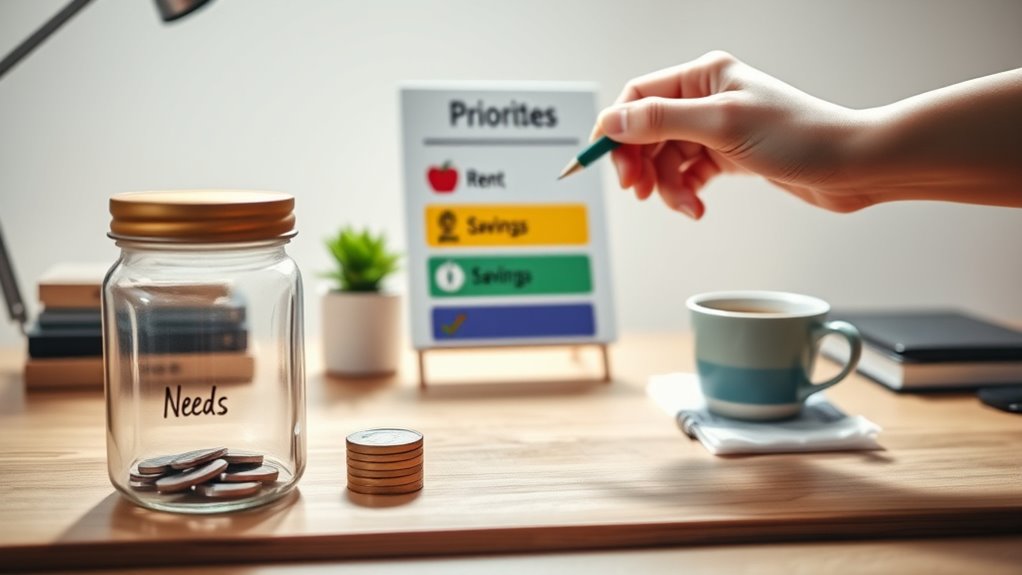
Once you’ve started tracking your expenses, it becomes easier to see where your money is going and make smarter choices. Prioritizing needs over wants helps you focus on essentials first, preventing unnecessary spending. For example, you’ll want to cover housing, utilities, groceries, and transportation before considering luxury purchases or entertainment expenses. Visualize your spending with:
- Paying rent or mortgage
- Buying groceries
- Covering utility bills
- Getting to work each day
Implementing budgeting strategies can further enhance your ability to manage finances effectively.
Build a Simple Emergency Fund
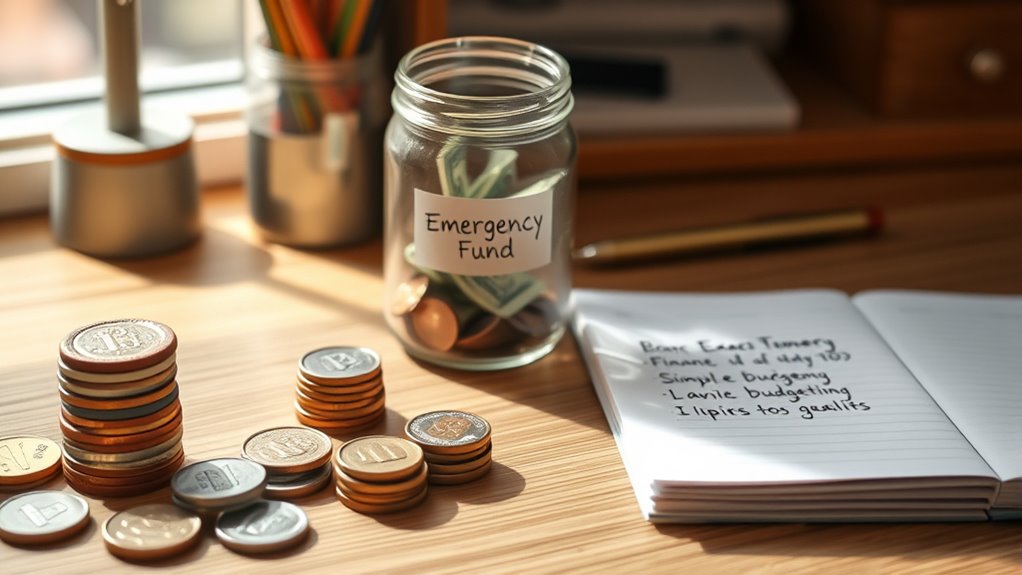
Building a simple emergency fund is a crucial step toward financial stability. It provides a safety net for unexpected expenses like car repairs or medical bills. To start, use basic savings strategies such as setting aside a small amount from each paycheck. Aim to save at least $500 initially, then gradually increase your goal to cover three to six months of living expenses. Incorporate this into your financial planning by making it a priority and automating transfers to your savings account. Keep your emergency fund separate from other savings to avoid temptation. Regularly review your progress, and adjust contributions as your income or expenses change. This simple approach helps you build a reliable cushion, giving you peace of mind and control over your finances. Focusing on personal growth can also motivate you to stay committed to your savings goals.
Review and Adjust Your Budget Monthly
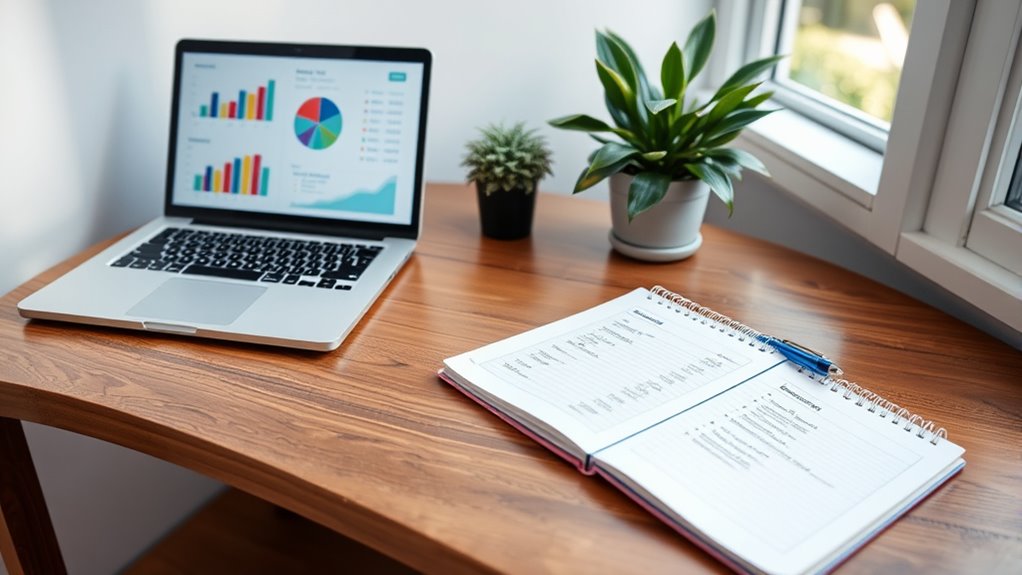
Each month, review your spending patterns to see where your money goes. If expenses change or goals shift, update your budget accordingly. This keeps your finances on track and helps you make smarter financial decisions. Paying attention to grocery savings strategies can also help you find areas to cut costs and optimize your budget.
Track Spending Patterns
Have you ever wondered where your money goes each month? Tracking your spending patterns helps you understand your cash flow and see which expense categories take up most of your budget. To do this, review your bank and credit card statements regularly. Picture yourself examining:
- Groceries, with receipts in hand
- Dining out, tallying each meal
- Utilities, checking bills for accuracy
- Entertainment, counting tickets or subscriptions
- Recognizing little financial habits that can add up over time
Revise for Changes
Why is it important to revisit your budget regularly? Life changes—your income, expenses, or financial goals—so updating your budget guarantees it stays relevant. Each month, review your spending and compare it with your plan. This helps you spot areas where you can improve your savings strategies or cut unnecessary costs. It also allows you to adjust for unexpected expenses or changes in income, supporting better debt management. Revising your budget isn’t about perfection; it’s about staying flexible and proactive. By making small adjustments regularly, you can stay on track toward your financial goals, avoid overspending, and build a stronger financial foundation. Incorporating healthy financial habits into your routine can further reinforce your financial stability. Keep your budget fresh and aligned with your current situation, so it continues to serve you effectively.
Frequently Asked Questions
How Can I Stick to My Budget During Unexpected Expenses?
When unexpected expenses hit, you can stick to your budget by relying on your emergency fund first. Keep a close eye on your expenses through regular expense tracking, so you know where your money is going. If your emergency fund covers the costs, replenish it as soon as possible. This way, you stay on track without derailing your financial goals, even during surprises.
What Tools or Apps Are Best for Simple Budgeting?
Sure, because who doesn’t love juggling dozens of apps? For simple budgeting, you’ll find digital tools like Mint, YNAB, and PocketGuard incredibly helpful. These mobile apps track your spending effortlessly, set savings goals, and give you clear visuals of your financial habits. They make sticking to a budget less of a chore and more of a game. So go ahead, embrace these tools and watch your money manage itself—almost.
How Do I Handle Irregular or Variable Income?
To handle income fluctuations, you should prioritize building an emergency fund that covers three to six months of expenses. When your income varies, base your budget on your lowest expected income, saving extra when you earn more. Track your expenses carefully, and adjust your spending as needed during lean months. This way, you create stability despite irregular income, giving you peace of mind and financial resilience.
When Should I Revisit and Revise My Budget?
Think of your budget like a trusty sailboat—sometimes you need to adjust your course. You should revisit and revise your budget whenever your financial situation changes, such as after a raise, unexpected expense, or a new goal. Regularly checking in helps keep your emergency fund on track and aligns your spending with your financial goals. Aim for at least once a month, or whenever life throws a curveball.
How Do I Balance Saving With Paying off Debt?
You should balance saving with paying off debt by prioritizing an emergency fund first, aiming for at least three to six months’ expenses. Use the debt snowball method to pay off smaller debts faster, freeing up money to boost your savings. Once your emergency fund is in place, shift more toward savings, but keep making consistent debt payments. This approach helps you stay secure while working toward financial freedom.
Conclusion
Budgeting might seem tricky at first, but it’s really about understanding your money and making smart choices. Some say that tracking every expense is pointless and overcomplicates things, but studies show that simple tracking can boost your savings considerably. By following these easy tips, you’ll gain control over your finances and build a more secure future. Remember, small consistent steps often lead to big financial wins—so start today and watch your money grow!










